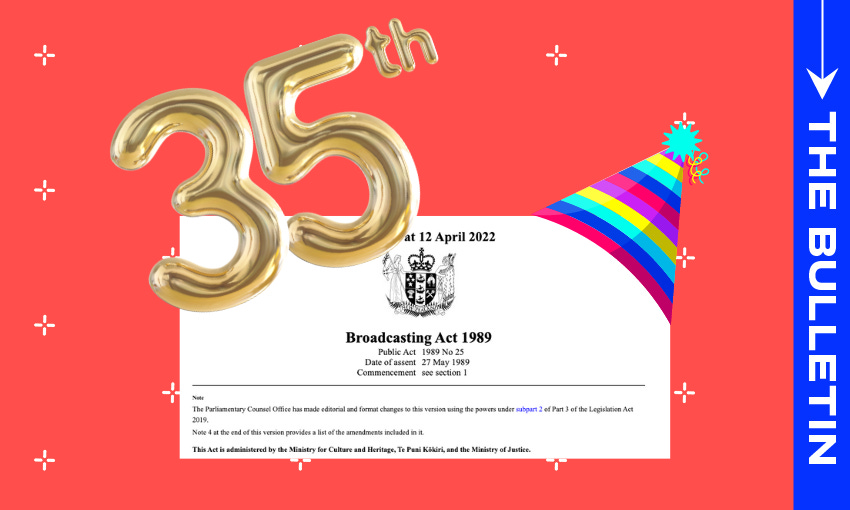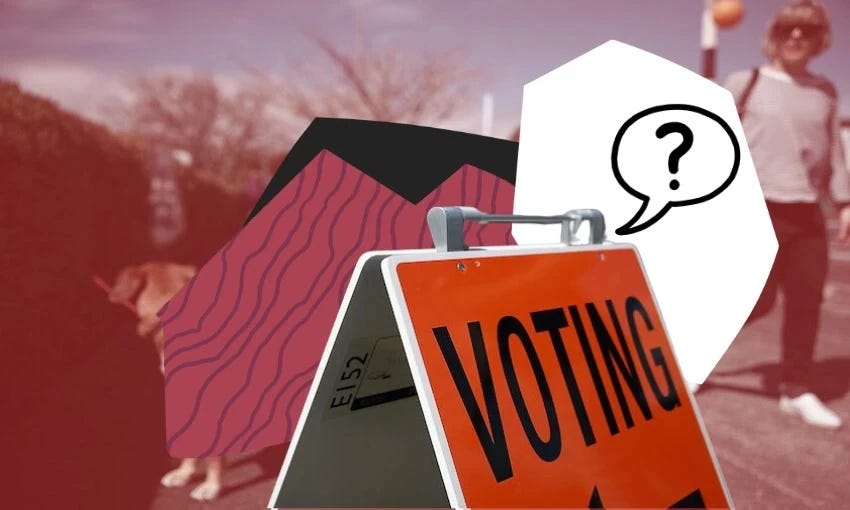The Broadcasting Act turns 35 and critics say an update is long overdue
Is it time for tougher regulation of what gets shared online?
Mōrena, and welcome to The Bulletin for Tuesday, May 28, produced in partnership with Blind Low Vision NZ.
In today’s edition: There are two sleeps until budget day, the death toll after a landslide in PNG could be as high as 2,000, and why is nobody going to the movies? But first, a landmark piece of legislation reaches a milestone anniversary.
Happy birthday to the Broadcasting Act
Yesterday marked 35 years since New Zealand’s Broadcasting Act was first implemented. The Act, which designates broadcasting standards, dates back to “the year David Lange resigned as prime minister, Sunday trading began, TV3 began operations, and the Holmes show was first screened”. There has also been a recent and concerted effort for change, which the Broadcasting Standards Authority supports. “The need for reform towards a modern, fit-for-purpose regulatory framework is urgent, and we stand ready to offer our expertise and support for future solutions,” said Stacey Wood, the authority’s chief executive. Broadcast news is governed by the BSA, including TVNZ and the newly named ThreeNews, which begins on July 6. So today we’ll take a look at the call for an upgrade of the Broadcasting Act, and how far away we are from that actually happening.
Moving with the times
Back in March, The Spinoff’s Alex Casey wrote a comprehensive oral history of the iconic Toyota Hilux “Bugger” ad from 1999. It paints a vivid picture of the current state of the Broadcasting Act. When that ad was released, the law was already a decade old. At the time, the ad sparked national outrage and an influx of complaints to the BSA over foul language. As Casey reported, a 1999 study by the BSA found that 16% of people surveyed found the use of the word “bugger” to be unacceptable on television and radio. Now, “bugger” has well and truly dropped off the BSA’s list of offensive terms. As Wood said yesterday, society has evolved dramatically since 1989, and “audiences are fast migrating from traditional broadcasting to new platforms”. Yet despite this, the law has largely stayed the same. Last November, Wood told RNZ’s Mediawatch that the existing legislation was “incredibly obsolete” and that there could be a case for a joined up mega agency taking on responsibilities from a range of complementary agencies like the Advertising Standards Authority and the Media Council.
What the government has said
The minister tasked with considering all of the above is Paul Goldsmith, who became media minister just last month after the sudden demotion of Melissa Lee. So far, Goldsmith hasn’t had a lot to say about his new portfolio, but has signalled his intention to look at the Broadcasting Act. Before losing the portfolio, Lee had argued for an update to the law. "The Broadcasting Act is from 1989. It was set in place well before the internet was available and there are regulations in there where certain segments of the broadcasting system is not regulated while local New Zealand broadcasters are regulated," she told Newshub. Lee was referring to the fact that the BSA only has oversight over analogue media, while online broadcasts are largely a free-for-all. As Stuff reported, Lee was unable to say how the law should be updated, only that New Zealand needed a regulation that’s “fit for purpose”. We’re no closer to learning what the government’s plans in this area are. The former government had plans to introduce new hate speech legislation that would have helped regulate online content. Work on that has since been ditched by Goldsmith in his capacity as justice minister. Writing for The Spinoff recently, Gavin Ellis said that Goldsmith’s ministerial positions, which also includes culture and heritage, make him ideally placed to play a “vital coordinating role in legislative reform” for the media.
Where we’re at
The impending launch of ThreeNews also illustrates further complications for our current media watchdogs. Currently, the Media Council has jurisdiction over online and written media, while the BSA keeps an eye on traditional broadcasters. As the Herald’s Shayne Currie noted last month, Stuff’s move into TV will mean it too falls under the jurisdiction of the BSA, while its online website will continue to be overseen by the Media Council. “[That] sounds like a bureaucratic nightmare”, wrote Currie, “perhaps the government might help.” Veteran journalist Richard Harman made a similar point in a recent interview with RNZ’s Mediawatch. He argued for a “one-stop shop” that would allow for regulatory oversight over all types of media. Earlier this month, as The Post reported, proposals to form such a new agency were dumped by the government. On that same Mediawatch programme, Internal Affairs minister Brooke van Velden said it would have been an extension of the proposed hate speech laws. “Regulating harmful content online poses questions of subjective opinion on what is harmful material,” she said. “I think the variety of different information, reaching all the way from media organisations and institutions right down to individual blogs and forums, is so wide that it is actually better for it to be held in individual departments through regulatory services." The BSA’s Stacey Wood told Mediawatch she was disappointed by this move. Paul Goldsmith did not respond to The Bulletin’s request for an interview on the subject.
Join The Spinoff Welly 500
Last August, The Spinoff hired Joel MacManus as its first-ever Wellington editor.His agenda-setting editorial project on the future of housing in the city, the War for Wellington, was funded entirely by existing Spinoff members and supported by many new donors.
To sustain and grow our work in Wellington, we now need to ask Wellingtonians for help. The Spinoff is looking for 500 people to donate $50 or more and join a new community of supporters, The Spinoff Welly 500. Find out more or join today.
Could Budget 2024 bring some surprises?
There are just two more sleeps until budget day and finance minister Nicola Willis has dropped a few more nuggets about what to expect. Stuff’s Tova O’Brien looks at that this morning, reporting that Willis said the budget had identified 240 individual savings initiatives, which could mean further surprise cuts or costs. As O’Brien noted, the death of first home grants wasn’t campaigned on, and had been ruled out on the campaign – could it signal more unexpected announcements on Thursday? Meanwhile, Willis has estimated the total number of jobs lost from the public sector is 2,250, with an additional 1,150 vacant roles cut. On BusinessDesk, Dileepa Fonseka (paywalled) looks at why Mfat was exempt from the cuts while Newshub’s Jenna Lynch questions whether the government still intends to fund 13 new cancer drugs.
Death toll in Papua New Guinea feared to hit 2,000
A devastating landslide in an isolated part of Papua New Guinea may have killed as many as 2,000 people, according to the latest reports. New Zealand remains on standby to assist, according to both PM Christopher Luxon and foreign minister Winston Peters, while Australia has provided $2.5m in initial humanitarian aid. The latest footage from the site of the landslide is both heartbreaking and terrifying, as this CNN report illustrates. Meanwhile, as local media have reported, the PNG government is experiencing another crisis. Prime minister James Marape is facing a vote of no confidence after a number of his MPs joined forces with the opposition.
Listen: Behind the Story
Joel MacManus joins Madeleine Chapman to discuss reporting in hostile environments. For The Spinoff editor’s thoughts on the week that was, as well as a handpicked collection of the week’s best reads, subscribe to The Weekend with Madeleine Chapman newsletter at thespinoff.co.nz/newsletters.
Click and Collect
There’s a new MP in parliament. The Spinoff’s Joel MacManus meets Francisco Hernandez, the Member for Posting who’s logged off.
I mentioned last week how much I loved Furiosa. Critics love it too. So why is it bombing at the box office? And why aren’t we flocking to the movies anymore?
A recent ranking of the best 100 albums of all time by Apple Music proved incredibly controversial. On his Boiler Room Substack, Chris Schulz argues that rankings like this are “staggeringly stupid” and I think he’s right.
Auckland Transport backtracks on K Rd bus lanes that were pulling in more than $100,000 a week in fines. In Wellington, bus lane monitoring is being increased.
We talked a couple of weeks ago about the plight of RSE workers stranded in New Zealand after the collapse of Air Vanuatu. This Stuff report looks at what’s happened since.
Shanti Mathias explains the Māori wards bill currently going through parliament. Lucinda Bennett meditates on the nature of eating while grieving. Gabi Lardies is shocked to learn why you're not supposed to pick up your own phone if you drop it on a plane. And here are all the new movies and TV shows on streaming services this week.
What you should be reading
The Spinoff’s Madeleine Holden shares what’s on her reading list this week.
Whether or not you're into athletics, you have to read Mad Chapman's personal essay-cum-profile of her former javelin rival Tori Peeters, What it takes to be an Olympian and why you don't have it. I'd also like to shout out this beautiful and very funny story about getting a Samoan tatau – it was under read for how good it is, in my humble opinion.
For features from further abroad, I have become a huge Justin Smith-Ruiu head lately and his recent defence of country music encapsulates everything I've come to love about him.
That’s it for this morning, thanks for reading. I’ll catch you back tomorrow.
Got some feedback about The Bulletin, or anything in the news? Get in touch with me at thebulletin@thespinoff.co.nz.
If you liked what you read today, share The Bulletin with friends, family and colleagues.
















